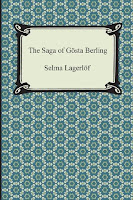Stories of love and adventure involving rich and not, lovely and not, brave and not, in the Värmland region of Sweden, mostly tied together by our eponymous protagonist.
Book Review: The Story of Gösta Berling is told as a collection of folk tales transmuted into a novel. Some of the tales involve our hero Gösta Berling, but many don't. Gösta Berling reminded me of so many other stories: One Hundred Years of Solitude, "The Lottery," Tortilla Flat or Cannery Row, The Birds, perhaps a touch of the Byronic hero (his horse is named Don Juan), and of course an infinite number of folk tales. In fact, although one can't help but think of the label "magical realism," the real origin of this novel is in the magic and wonder of old folk stories and fairy tales told around a fireplace. Those stories had no end of the extraordinary posing as actual. It's as if Hans Christian Andersen had written a novel. And if he had, he couldn't've done better than Gösta Berling. The story is written in a rich, energetic, voluptuous language, and Berling is something of an Odysseus, a Kokopeli, a mixture of duty, opportunism, and cleverness An unfrocked priest, he is an imperfect man, called the "strongest and weakest of men." He does wrong as well as right. A unique hero, he's described as having "lived though more poems than all our poets have written." So there! He's named the "lord of ten thousand kisses and thirteen thousand love letters." He's "a drunkard, a Cavalier ... ."
Gösta Berling was Selma Lagerlöf's first novel, and what an amazing first novel, a happy mix of Arthurian tales and Christian memory. As our narrator says, "I have nothing new to tell you, only what is old and almost forgotten. I have legends from the nursery ... or from the log-fire in the cottage ... or from the hall, where old men sat in their rocking chairs, and ... talked of old times." That is this book. Given its folk tale origins, there is folkish poetry in its repeated phrases, such as "the highway is my home and the haystack my bed." There's a bear that can only be killed by a silver bullet. There are places one is cursed to never leave: "This was exactly the seventeenth time squire Julius had tried to leave Ekeby ... [he] had already forgotten both this and all his previous attempts." We hear of actual paintings of saints that walk back "dripping with water ... stained with green slime and brown mud" from the depths of the watery grave in the lake in which they'd been thrown. We watch a battle between peasants and the tradesmen. Berling is the center of our story, but there are myriad others' stories as well. We have a mass bear attacks led by an old major, creatures of which "it is dangerous to call it by its right name." Ravening packs of wolves. Someone who may be in league with the Horned One. The witch of Dovre. The author is unafraid to venture into philosophy in her folk tales.
When Lagerlöf touches on existentialism (discovered by one of the Cavaliers before Sartre was born), the young Countess says, then "how ugly and gray the world is; how futile everything is! I should like to lay down and die." She soon discovers that Love is the answer to the bleakness of an existential world. She also takes us into the grim terrors of old folk tales, describing an attack of wolves "until the wife must take her little child ... and throw it to them, to save her own and her husband's life." Our narrator notes: "often a soul that has tried all other sensual pleasures endeavours to find delight in cruelty." Hills overgrown with sedge "which had been sowed there as a reminder that no man's life is like another's, but differ like leaves of grass." Selma Lagerlöf was the first woman to win the Nobel Prize for literature. While some might see picking Lagerlöf as a bit of favoritism by the Swedish judges, based on this single example I see nothing to say it wasn't deserved. "The Story of ..." is also known as "The Saga of ...", but my copy, printed in Sweden in 1959 and translated by Pauline Bancroft Flach (and perhaps W.H. Hilton-Brown?) in 1898, titles it as "Story" so that's what I used here. from the land of Ikea, Saab, and Abba comes a story I somehow feel privileged to have read. [4★]

No comments:
Post a Comment